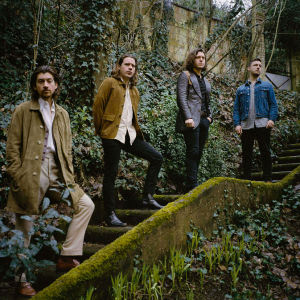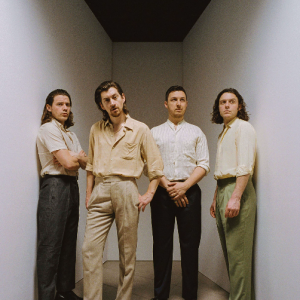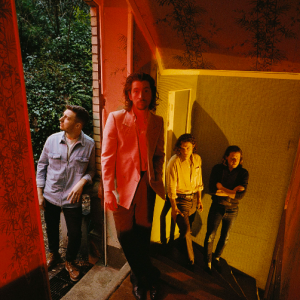Tranquility Base Hotel & Casino, Arctic Monkeys, an interview with Alex Turner
// Por: Alejandro Franco
vie 11 mayo, 2018
The first time I listened to Arctic Monkeys, it was under the premise that they were “the next big thing in the UK”, one of the firsts success stories on Myspace, and young as hell. Today, Alex Turner is a 32-year-old man, with a consolidated band in the music industry, who apparently is still making music for the right reasons.
I´m in one my favorite spots in LA, the 101 Coffee Shop, where a tofu based platter called ‘No huevos rancheros’, has made me question my Mexican standards toward an almost national dish.
Craziest thing, is that for the first time I’m not here to eat tofu, (which will surely happen later) but to meet Mr. Turner, not in the dinner, but in a just beside underground bar called The Minibar, where he makes usual visits at night for a drink or two.
It was a rainy morning in LA, very british in the mood by the way, and here he comes with a seventies beige suite, and a perfect pronunciation of my name: “Alejandro”, as we happen to be “tocayos” as we call it in México when you share the name with someone. We are ready to talk about “Tranquility Base Hotel & Casino”, Arctic Monkey´s first new album in more than five years… No pressure at all, right?
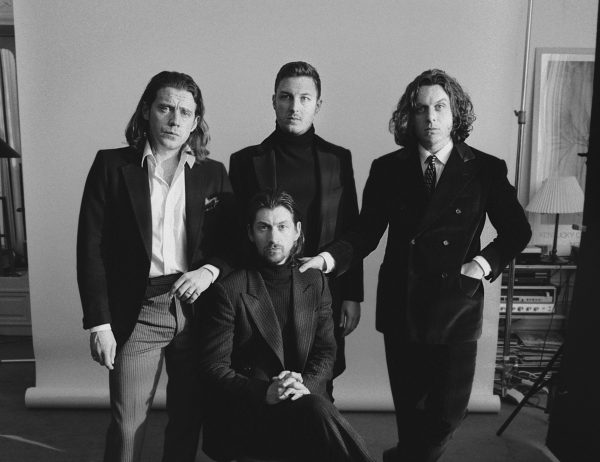
You moved to LA in 2012, it seemed like a smart move from the outside, how was the transition?
The way I remember it…is that we came here, did Humbug and Suck It and See. And after that we really just never went back. There were a few reasons that arrived at the same time, that led us to make the decision to stay here, in my memory, we just stayed around.
Once we started to make some friends, it just opened up, it changed for us, really enjoying spending time here. Also, at that time the four of us weren’t living in the same place, and we all came to LA before that AM Record, and lived in the same neighborhood, Mathew and I even in the same house, so in a way it was the beginning again, because we were all living in the same neighborhood again, so that was part of the appeal. I suppose that excitement that comes with the idea of new chapter.
I feel somehow it’s related to this new album; the small house, the studio, you playing the piano…
Definitely. I remember when the last album came out, there was discussion about the idea that the songs are set in places that seem very L.A. , which I don’t know, if I completely subscribe to, but in this one, it is. I think America even gets mentioned a few times, I don’t think I’ve done that before, but the distinction that I make of this album, is that, it’s the first time I’ve started to write and record in isolation, at home, in Los Angeles. With a Tascam Recorder, using the recording device as a writing tool, and it’s the combination of that with the piano, and a couple of keyboards I have in there. A lot of the vocals we hear on the record are from the takes when I was still writing the original ones.
When you’re in that moment before everything is thought out, you have this opportunity, to capture something you don’t get to do again, and that seemed to happen in this record more than I could have ever imagined.
Because sometimes you have these amazing demos then everything changes in the, recording studio, and you lose something right?
I certainly say, I found this to be the case. We replaced all the drums, kept most of the vocals from home, there was another session we did in Hollywood, where we added some interesting sounds, and we kept that energy of the band, that was the kind of material that came over of the tapes from home.
When I didn’t even think the lyrics were complete, and then I came back, trying to sing them again, and it wasn’t even close. Whatever that was captured there, was left months ago.
So it’s a ‘different approach’ album for you guys, adding new sounds, the lyrics are also very specific, and are almost original recordings?
There are more instances of that being the case in this album, than I could have ever imagined, like a first line, that I certainly expected to completely change, and when I came back around, it just seemed to be where it was supposed to be, and that happened two or three times. Even if the lyric wasn’t quite right, there was something about the performance and the feel, that I attribute to often being the only person in the house at the time. My only focus seemed to be on; press record and rewind, there wasn’t much analysis given to it. And it doesn’t work every time, there are few vocals I recorded in France, like The Ultracheese, that last track, which that tune benefitted from.
How did the title of the album come, is there a concept behind it?
The title is taken from the song, of the same title, the lyric was put in there really to have an excuse. The way I imagined Marc, he was there first, and I put him in the hotel, on a future moon colony, it gave me a setting for some scenes in the record, that allowed me to find the poetry in places that I haven’t been able to go before. I had reached but not opened this idea of science fiction and all that surrounds it. There’s nowhere else to go.
So the album started in L.A and then you post produced it in France…
In a studio called Electro Box, is where we recorded some of the drums and base, there’s an incredible collection of keyboards at this place, where we added the electrics, the orchestra, the wobbly string sound, the vibraphone, and then in France, was where we recorded some of the songs we hadn’t recorded yet.
The way I see it is that the piano and vocals were at the house, the electrics, were at Electro Box, and the energy of it was at the Hollywood session. In France, is when we were all together, for five weeks, staying in the building where we were working, it seemed like a long time ago that it had happened, and we had the most enjoyable time together, a lot of laughter.
Was it your first time really involved with the piano?
It was, yeah. As a child, when I was about 8 years old, I had piano lessons, that’s when I realized I had some sense of pitch, but I never became interested in playing music, to the point I didn’t even take music in High School, it wasn’t until I got a guitar that I really got interested in playing a musical instrument. But I could always play a little bit of piano, and whenever I was around one, I’d jump on it, I had one growing up.
My dad is a Saxophone and Trumpet player, and everyone could play piano so I think I often tried to play the types of things that he would play, he’s more into jazz than I am. The reason, I feel that I play whatever I play when I touch a piano, is a result of him listening to The Gap Band , to the point that in this record, every time I play a moment of a turn around, I think of my dad, it’s the kind of move he would make, it makes me feel like I’m in a room next to him playing the piano.
But I never expected that to evolve into a composition in an album. When I finally got this piano of my own, that’s exactly what happened.
It’s not a lounge record, or a jazz record by any means, -it’s Arctic Monkey songs with piano- it’s all it really is! I think it’s different from the last one, but you when arrive it sounds like the same band.
So, will this change the live performance?
It does playing the new songs, but we’re configured differently to do that, with a lot of keyboards,and guitars, so for instance; Tom Rowley who came on the road with us in the AM Record and play keys live, we finally got him in the studio for the first time, I was really excited about it, he’s a friend we’ve known for a long time, and a really good guitar player, and he’s doing these electric prunes, release of an ORF kind of solo, which nobody else is going to able to play but him, so he’s doing that on the show, which means we have to configure around that.
The album starts with you saying- “I just wanted to be one of The Strokes”…this may be one of the most important lines for a generation, because it happened, suddenly in the 2000’s rock came back.
It’s definitely truthful, it’s something I expected to change, but when I came back around to change it, it seemed like it was to blunt to resist leaving as it was, and I think it’s important to know where the rest of the lyric goes on from that, and also the sound of the music underneath is where that idea came from. But to me, every time I sing it, makes me think of how time seems to have passed so quickly, I think that part of the reasons I was affected to leave it as it was.
And it took you four or five years between the last AM Record, and this one?
I thought it was four years, until yesterday when someone informed me, I was also informed that I’ve been in the band half of my life, since I’m thirty-two now, and have been in the band since I was 16.
Do you remember a moment surrounded by this music listening to the Strokes or whoever, when you though, -we can do this-…
That was a really exciting time, with The Strokes, and the White Stripes, and we had friends that would play covers of their songs, I think that was when I thought we could do this, have our own band and play in the pub and see where it goes from there.
This interview is available in Spanish & English (link en bio) Coming soon in #WARPMagazine88 #SpringSummer2018
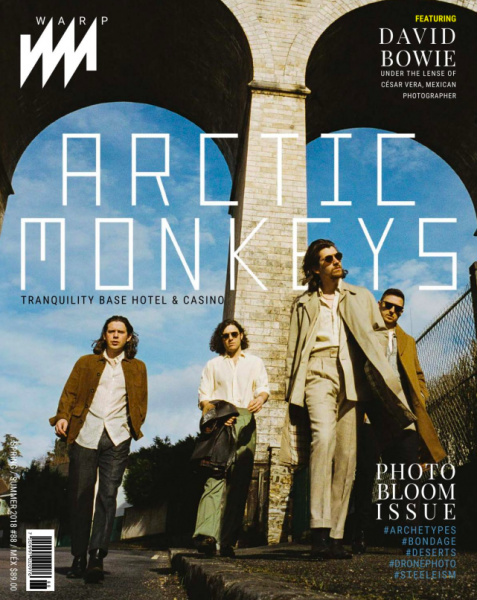
Read the full interview in spanish here.
